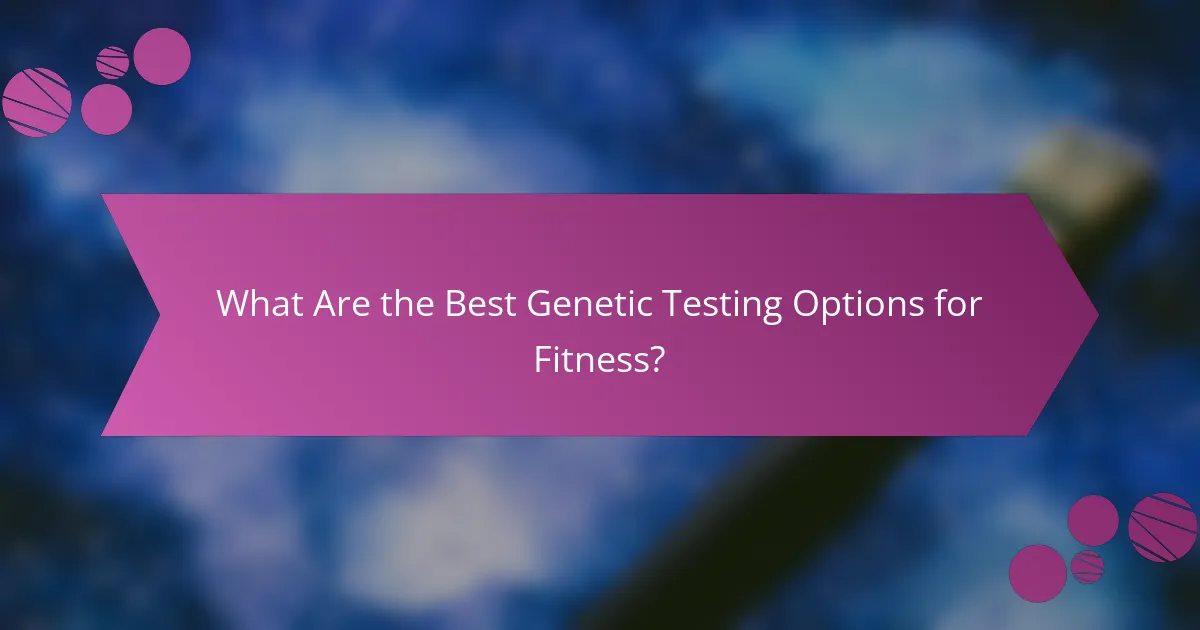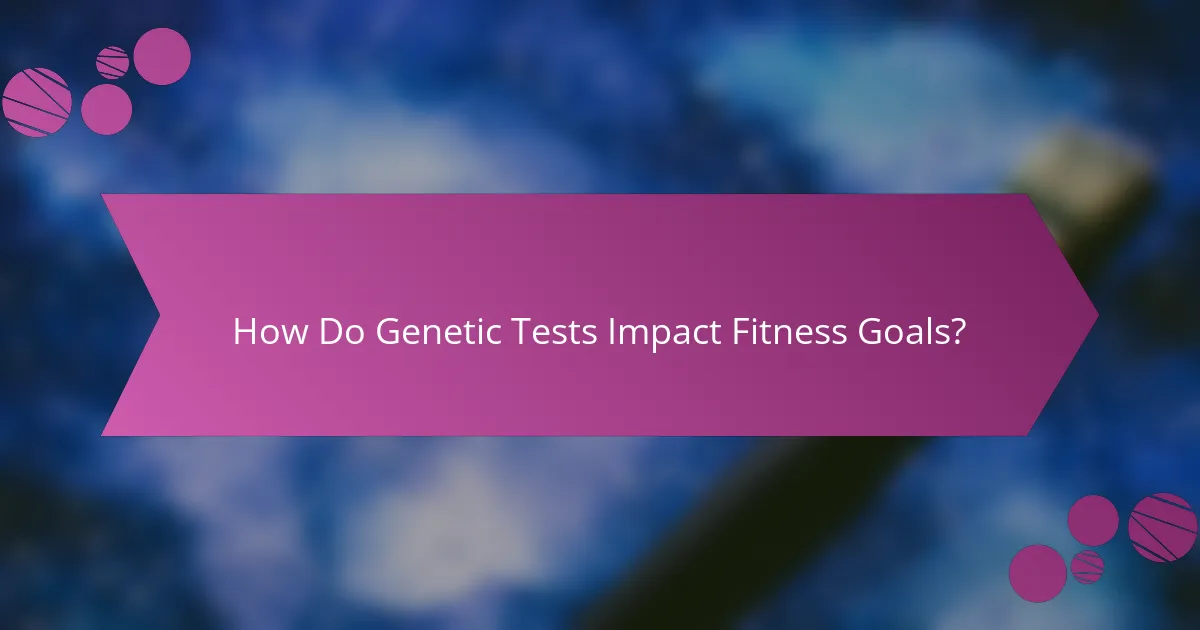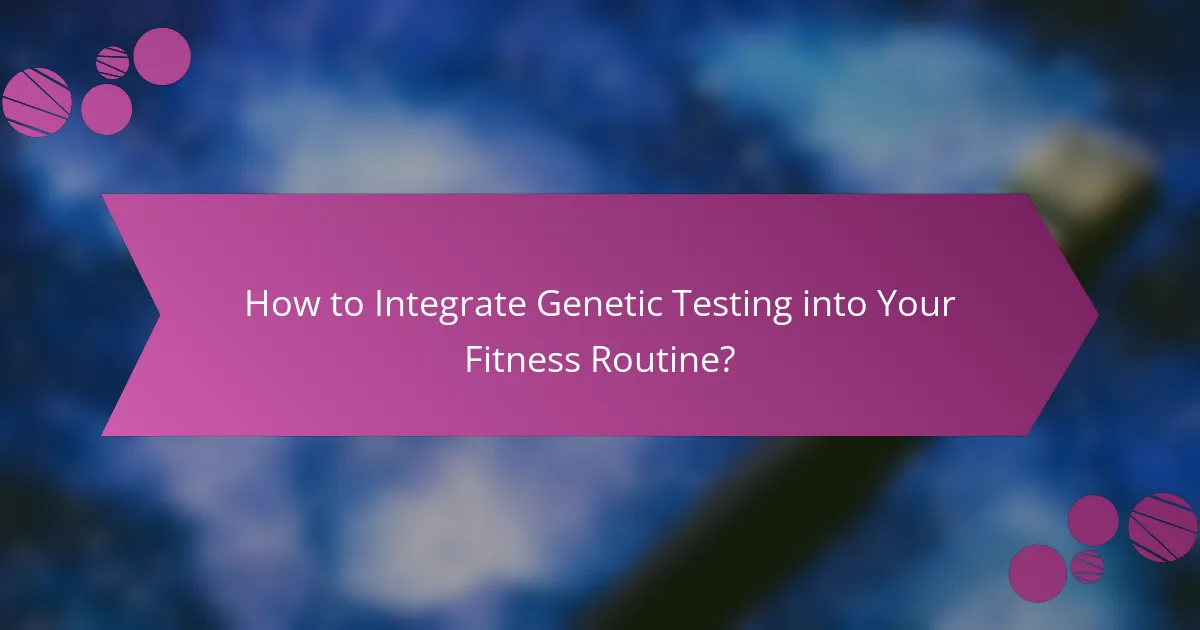Exploring genetic testing options can provide valuable insights into how your DNA affects your fitness journey, including aspects like performance, recovery, and health. By analyzing specific genetic markers, these tests can help you create personalized training and nutrition strategies, ultimately enhancing your effectiveness in reaching your fitness goals. When choosing a genetic test, it’s essential to consider factors such as cost, the markers analyzed, and privacy policies to ensure you gain meaningful insights tailored to your needs.

What Are the Best Genetic Testing Options for Fitness?
The best genetic testing options for fitness provide insights into how your DNA influences your physical performance, recovery, and overall health. These tests can guide your training and nutrition strategies, helping you tailor your fitness journey to your unique genetic profile.
23andMe Fitness Reports
23andMe offers fitness reports that analyze genetic markers related to athletic performance, muscle composition, and recovery. The service provides insights into whether you may excel in endurance or power sports, helping you choose appropriate training regimens.
Consider the cost, which typically ranges from $99 to $199, depending on the package you select. The results can be accessed online, making it easy to integrate findings into your fitness plan.
DNAfit Training Recommendations
DNAfit focuses on personalized training and nutrition recommendations based on your genetic data. The test evaluates genes associated with fitness, recovery, and dietary needs, allowing for tailored advice on workout types and meal plans.
Prices generally range from $149 to $249, and the detailed reports can help you optimize your training schedule and nutritional intake for better results.
MyHeritage Health Insights
MyHeritage offers health insights that include genetic factors affecting fitness and wellness. While primarily focused on health risks, it also provides information on how your genetics may influence your exercise response and dietary preferences.
With a subscription model starting around $29 per month, this service can be beneficial for those looking to understand their overall health alongside fitness insights.
Everlywell Genetic Tests
Everlywell provides a range of at-home genetic tests, including options that assess fitness-related traits. These tests can reveal how your body responds to exercise and recovery, informing your fitness strategies.
Prices vary by test but generally start around $99. The convenience of home testing makes it accessible for those who prefer not to visit a lab.
Genomind Fitness Profiles
Genomind specializes in mental health but also offers fitness profiles that explore the connection between genetics and physical performance. Their tests can help identify how your genetic makeup affects motivation, stress response, and recovery.
Costs typically range from $199 to $299, and the insights can be particularly useful for those looking to enhance their mental resilience alongside physical training.

How Do Genetic Tests Impact Fitness Goals?
Genetic tests can significantly influence fitness goals by providing insights into how your body responds to diet and exercise. These tests analyze genetic markers that can inform personalized strategies for nutrition and workouts, enhancing overall effectiveness and efficiency in achieving fitness objectives.
Personalized Nutrition Plans
Genetic testing can help create tailored nutrition plans based on your unique genetic makeup. For instance, some individuals may have variations that affect their metabolism of carbohydrates or fats, suggesting a diet higher in one macronutrient over another. Understanding these genetic predispositions can lead to improved energy levels and weight management.
When developing a personalized nutrition plan, consider factors such as food sensitivities, vitamin absorption rates, and predisposition to certain nutrient deficiencies. For example, if a genetic test indicates a higher need for omega-3 fatty acids, incorporating more fish or flaxseed into your diet could be beneficial.
Optimized Workout Regimens
Genetic tests can also inform optimized workout regimens by revealing how your body responds to different types of exercise. Some people may be genetically predisposed to excel in endurance activities, while others may find strength training more effective. This information can guide you in selecting workouts that align with your natural abilities.
To maximize your fitness results, consider integrating a mix of aerobic and resistance training based on your genetic insights. For example, if your test suggests a higher response to strength training, focus on weightlifting and high-intensity interval training (HIIT) to build muscle and burn fat efficiently. Regularly reassess your regimen to ensure it remains aligned with your evolving fitness goals and genetic insights.

What Should You Consider When Choosing a Genetic Test?
When selecting a genetic test for your fitness journey, consider factors such as cost, the types of genetic markers analyzed, and privacy policies. These elements can significantly influence the value and relevance of the insights you gain from the test.
Cost of Testing Services
The cost of genetic testing services can vary widely, typically ranging from around $100 to over $1,000. Basic tests that analyze a few markers may be more affordable, while comprehensive panels that provide extensive insights into fitness and health can be pricier.
When evaluating costs, consider not only the initial price but also any additional fees for consultations or follow-up services. Look for options that offer good value for the insights provided, ensuring they align with your fitness goals.
Types of Genetic Markers Analyzed
Genetic tests can analyze various markers related to fitness, including those associated with metabolism, muscle composition, and recovery. Some tests focus on single nucleotide polymorphisms (SNPs), which can influence how your body responds to exercise and nutrition.
Choose a test that aligns with your specific fitness interests. For example, if you are focused on endurance sports, look for tests that provide insights into aerobic capacity and fat metabolism. Understanding the types of markers analyzed helps you gauge the relevance of the results to your fitness journey.
Privacy and Data Security Policies
Privacy and data security are crucial when selecting a genetic testing service. Ensure the company has clear policies on how your genetic data will be used, stored, and shared. Look for services that comply with regulations like HIPAA in the U.S. or GDPR in Europe to protect your personal information.
Before proceeding, review the terms of service and privacy policy to understand your rights regarding data ownership and the potential for data sharing with third parties. Prioritizing companies with strong security measures can help safeguard your sensitive genetic information.

What Are the Limitations of Genetic Testing for Fitness?
Genetic testing for fitness has several limitations that can affect its effectiveness. While it can provide insights into potential strengths and weaknesses, the results are not definitive and should be considered alongside other factors such as lifestyle and environment.
Accuracy of Results
The accuracy of genetic testing results can vary significantly depending on the testing method and the specific genes analyzed. Some tests may only examine a limited number of genetic markers, which can lead to incomplete or misleading conclusions about fitness potential. It’s essential to choose reputable testing services that utilize comprehensive methodologies.
Moreover, the interpretation of genetic data can be influenced by individual variability. Factors such as age, sex, and ethnicity can affect how genes express themselves, meaning that results may not apply universally to all individuals.
Interpretation of Genetic Data
Interpreting genetic data requires a nuanced understanding of genetics and its implications for fitness. Many genetic tests provide raw data that may not be easily understood without professional guidance. It’s advisable to consult with a genetic counselor or a fitness expert who can help translate the findings into actionable fitness strategies.
Additionally, genetic predispositions do not guarantee outcomes. For example, someone may have a genetic marker associated with endurance but still need to engage in regular training and proper nutrition to achieve their fitness goals. Balancing genetic insights with practical fitness approaches is crucial for success.

How to Integrate Genetic Testing into Your Fitness Routine?
Integrating genetic testing into your fitness routine involves understanding your genetic predispositions and tailoring your exercise and nutrition accordingly. This personalized approach can enhance your performance, optimize recovery, and help you achieve your fitness goals more effectively.
Consulting with Fitness Professionals
Working with fitness professionals who understand genetic testing can provide valuable insights. They can help interpret your genetic results and create a customized fitness plan that aligns with your strengths and weaknesses. Look for trainers or nutritionists who have experience with genetic data to ensure you receive informed guidance.
Consider discussing specific genetic markers related to endurance, strength, or recovery with your fitness coach. This can help you focus on workouts that suit your genetic profile, such as high-intensity interval training for those predisposed to endurance or strength training for those with a genetic inclination towards muscle growth.
Tracking Progress Over Time
To effectively integrate genetic testing into your fitness journey, it’s crucial to track your progress over time. Regularly monitor your performance metrics, such as strength gains, endurance levels, and recovery times, to see how your body responds to the tailored regimen. This data can help you adjust your fitness plan as needed.
Use tools like fitness apps or journals to log workouts and nutrition, comparing them against your genetic insights. This ongoing assessment will allow you to identify patterns and make informed decisions about your training and dietary choices, ensuring they remain aligned with your genetic predispositions.


